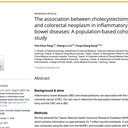Attenuation of LPS-induced lung inflammation by glucosamine in rats.
Keywords
Abstract
Acute inflammation is often observed during acute lung injury (ALI) and acute respiratory distress syndrome. Glucosamine is known to act as an anti-inflammatory molecule. The effects of glucosamine on acute lung inflammation and its associated mechanisms remain unclear. The present study sought to address how glucosamine plays an anti-inflammatory role in acute lung inflammation in vivo and in vitro. Using the LPS intratracheal instillation-elicited rat lung inflammation model, we found that glucosamine attenuated pulmonary edema and polymorphonuclear leukocyte infiltration, as well as the production of TNF-α, IL-1β, cytokine-induced neutrophil chemoattractant (CINC)-1, macrophage inflammatory protein (MIP)-2, and nitric oxide (NO) in the bronchoalveolar lavage fluid (BALF) and in the cultured medium of BALF cells. The expression of TNF-α, IL-1β, IFN-γ, CINC-1, MIP-2, monocyte chemotactic protein-1, and inducible NO synthase (iNOS) in LPS-inflamed lung tissue was also suppressed by glucosamine. Using the rat alveolar epithelial cell line L2, we noted that the cytokine mixture (cytomix)-regulated production and mRNA expression of CINC-1 and MIP-2, NO production, the protein and mRNA expression of iNOS, iNOS mRNA stability, and iNOS promoter activity were all inhibited by glucosamine. Furthermore, glucosamine reduced LPS-mediated NF-κB signaling by decreasing IκB phosphorylation, p65 nuclear translocation, and NF-κB reporter activity. Overexpression of the p65 subunit restored the inhibitory action of glucosamine on cytomix-regulated NO production and iNOS expression. In conclusion, glucosamine appears to act as an anti-inflammatory molecule in LPS-induced lung inflammation, at least in part by targeting the NF-κB signaling pathway.


